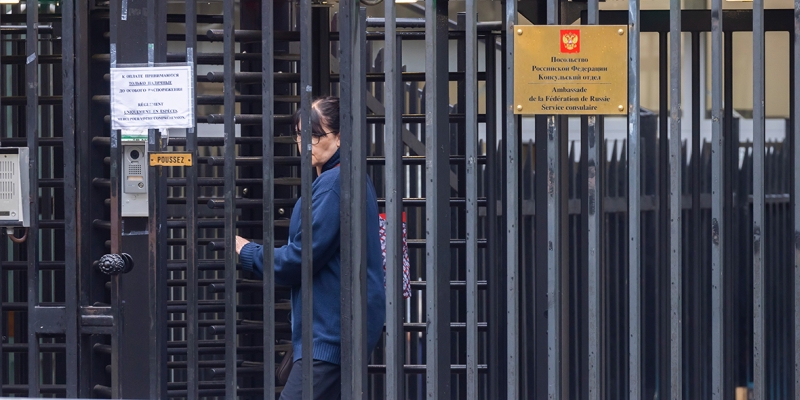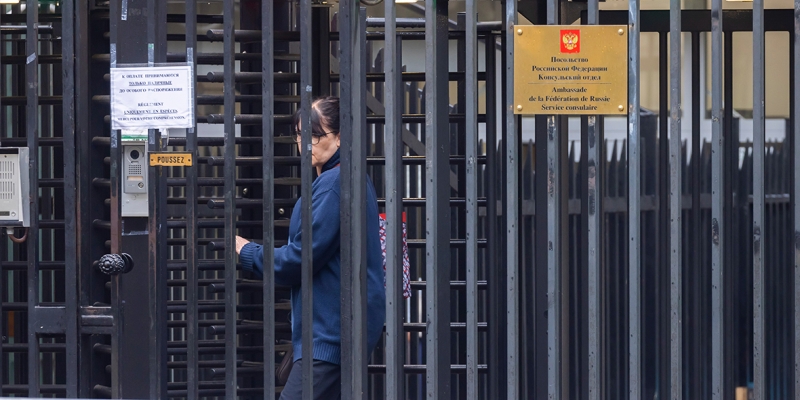ZWestern countries have expelled almost four hundred Russian diplomats and closed a number of Russian consulates general. Such steps will complicate the work of Russian embassies and increase the burden on the central office of the Ministry of Foreign Affairs, experts are convinced

Russian Embassy in Paris
How many Russian diplomats were expelled from Europe
On Wednesday, Greece (expelling 12 people), Norway (expelling three), Luxembourg (one diplomat) joined the number of countries that announced the expulsion of Russian diplomats. Mass expulsions of foreign ministry employees from EU and allied countries began at the end of March and by the beginning of April set an anti-record – the total number of expellees is approaching 400. This is the highest number since 2000 (no earlier data are available), it has already surpassed the expulsion that followed the attempted poisoning of Sergei and Yulia Skripal in 2018.
Poland was the first to announce the expulsion of 45 employees of Russian diplomatic missions from the country on March 23. A week later, the Netherlands declared 17 people persona non grata, Belgium announced the expulsion of 21 Russian diplomats, Ireland- four. The official representative of the Ministry of Foreign Affairs, Maria Zakharova, on the air of the Russia 1 TV channel, called the current situation an attempt to bleed the country’s diplomatic missions and pointed to the political component of this step. Later, Zakharova’s comment appeared on the Foreign Ministry’s website, which said that Moscow would take retaliatory measures.
The second wave of expulsions began on April 4 with reports from the German newspaper Bild that Germany was preparing to expel about 100 Russian diplomats. Later, Der Spiegel magazine clarified the figures: it was about 40 diplomats. The country’s Foreign Minister Annalena Berbok confirmed the expulsion on the same day, but did not name a specific number of people.
Later, the French Foreign Ministry announced about joining the “demarche of European countries”. The ministry reported on the expulsion of Russian diplomats due to the fact that they “engaged in activities contrary to the security interests of France”. The France Press agency clarified that we are talking about 35 diplomats. On April 5, the Danish Foreign Ministry announced that 15 Russian “intelligence agents” should leave the country within 14 days. “This is a historic step that we are taking here from the Danish side. But we also do thistogether with a large number of European countries, because we want to protect our security,” said the country’s foreign minister, Eppe Kufud. Almost simultaneously, Italian Foreign Minister Luigi Di Maio announced the decision to expel 30 Russian diplomats in the interests of national security. Sweden has decided to expel three embassy employees, arguing that they do not work in accordance with the Vienna Convention on Diplomatic Relations.
Read on RBC Pro Pro Tammy Erickson: trust holds the company together like glue Articles Pro To whom in fact it is now impossible to sell apartments without permission Articles Pro Founder Hoff Mikhail Kuchment: “The first does not mean the best” Articles Pro Job seeker in priority or back in the 1990s: what will happen to the labor market Articles Pro Founder of “Teremka”: the word “failure” is better for an entrepreneur to forget Articles Pro Planning horizon – one day: logistics plunged into a new crisis Forecasts Pro Carefully, shops are closing: what is happening in the rental market of the Article Pro You need to reduce the wage fund. How to Do It Legally Instructions
Commenting on the decisions of European countries, the press secretary of the President of Russia Dmitry Peskov said that Moscow regrets them and that such actions will not remain unanswered. “The narrowing of opportunities for diplomatic communication, diplomatic work in such difficult conditions, in such unprecedented difficult and crisis conditions is a short-sighted step, which, firstly, will further complicate our communication, which is necessary for the search for a settlement. And, secondly, it will inevitably lead to retaliatory steps,” he said.
After Peskov’s words, the expulsions of Russian diplomats continued. Spain declared 25 Russian diplomats persona non grata, Slovenia – 33, Portugal and Romania – 10 people each. There were 19 people from the permanent Mission of Russia to the EU in Belgium.
Where the consulates General were closed
Lithuania became the first country to lower the level of diplomatic relations with Russia. Lithuanian Foreign Minister Gabrielius Landsbergis said that the country is expelling the Russian ambassador and closing the Consulate General in Klaipeda. The Lithuanian ambassador to Moscow, according to Landsbergis, will also return soon. At the same time, a week earlier, the Lithuanian Foreign Minister said that the issue of closing the Consulate General of Russia in Klaipeda is “complicated” because the country participates in a trilateral agreement with the EU and Russia and provides transit to Kaliningrad.
“Part of the transit is carried out through consular offices both in Kaliningrad and on the mainland of Russia.”..”If we start closing consular offices, there is a high probability that the answer will threaten us with non-compliance with the contract,” Landsbergis said.
The governor of the Kaliningrad region Anton Alikhanov said in his Telegram channel that so far there are no restrictions on transit due to the closure of the Consulate General in Klaipeda. He added that the decision to close transit can only be made at the EU level. “Closing transit for the Baltic States will be extremely painful, logistics generates 20% (depending on the country) of the size of GDP.The transport complex of these countries is focused on the Russian market or transit cargo that goes through the territory of our country. I hope that international obligations to ensure transit to/from the Kaliningrad Region and economic factors for our own economies will be taken into account when making decisions. But, of course, we are ready for all options,” the governor wrote.
Latvia and Estonia have also decided to close some of the Russian institutions on their territory. Latvia announced the closure of two consulates general (in Daugavpils and Liepaja) and the expulsion of 13 Russian diplomats, Estonia expelled 14 employees of the Russian Embassy in Tallinn and closed the Consulate General in Narva and the office of the embassy in Tartu. At the same time, Tallinn stressed that they do not intend to expel the Russian ambassador from the country yet.
How expulsions will affect the work of embassies and the Russian Foreign Ministry
The staffing of Russian embassies abroad is not disclosed (this is a worldwide practice). Russia has not yet announced retaliatory measures, but usually in such cases adhered to the principle of reciprocity. Nevertheless, it is still difficult to assess how possible retaliatory measures will affect, among other things, the process of issuing visas to Russians (some EU countries, for example France, have resumed issuing tourist visas since April 1).
The reduction in the number of Russian diplomats in EU countries and the restriction of their activities will affect the quality of the information they collect and the breadth of contacts that diplomats maintain at the level of their admission, the Director General of the Russian International Affairs Council (RIAC) believes Andrey Kortunov. “There is nothing good here, and there is no logic in it either, because the morethe strained relations, the more intense the political dialogue should be. This is not a service that is rendered to the other party, and not a bonus that is provided for good behavior. This is a foreign policy tool that should be used especially in crisis situations, when the price of error or misunderstanding in the absence of information and contacts increases dramatically,” he told RBC.
According to Kortunov, the expulsion of diplomats is a relatively easy way for the authorities to demonstrate to the public that they are reacting to some unfriendly actions of the other side. “Unfortunately, I think this tactic will continue. We must understand that despite the importance of embassies now inIn many cases, a significant part of bilateral relations is conducted directly from the central offices of diplomatic departments. Embassies play their role, but since after the pandemic everyone has become more alert to work online, the central office of the Ministry of Foreign Affairs can partially take over some functions of embassies,” he added.
Kortunov expects that in connection with the expulsion of several hundred Russian diplomats, the Russian Foreign Ministry will make certain decisions on the reorganization of its work. “It is possible that the staff of the relevant departments will be expanded, that is, people who used to work in embassies will be assigned to specialized geographicaldepartments responsible for the countries in which they were previously located. Perhaps there will be a distribution between countries, that is, the number of our diplomats in countries that are not on the list of “unfriendly” will increase, the expert predicts. At the same time, he is confident that the load on the central office of the Ministry of Foreign Affairs will grow.
Retired Ambassador (former Ambassador to Slovakia and Algeria) Alexander Aksenenok agrees with this. He recalled that the current expulsions related to the events in Ukraine were preceded by others. In particular, over the past few years, EU countries have periodically declared several people persona non grata, Aksenenok noted. “This will be an element, if not unemployment, then temporary unemployment for diplomats. It is not so easy to arrange such a large number in the central office,” he told RBC.
The expert did not rule out that the expelled Russian diplomats would be transferred to work in diplomatic missions in other countries. “This is a common practice. Regional specialization has been widespread in Russia since Soviet times. There is no regional specialization as such in the USA. Usually there is a 3 + 3 system: three years of work overseas in one country, and then transfer to another region. In thisIn a sense, they have more versatility,” he explained, noting that Russian practice can be reformatted in the current conditions. “There is no other choice. If this is a young diplomat, then you will have to wait for some time. These are big personnel problems for the ministry,” concluded Aksenyonok.
Subscribe to Telegram RBC Keep up to date with the latest news even under lockdown

